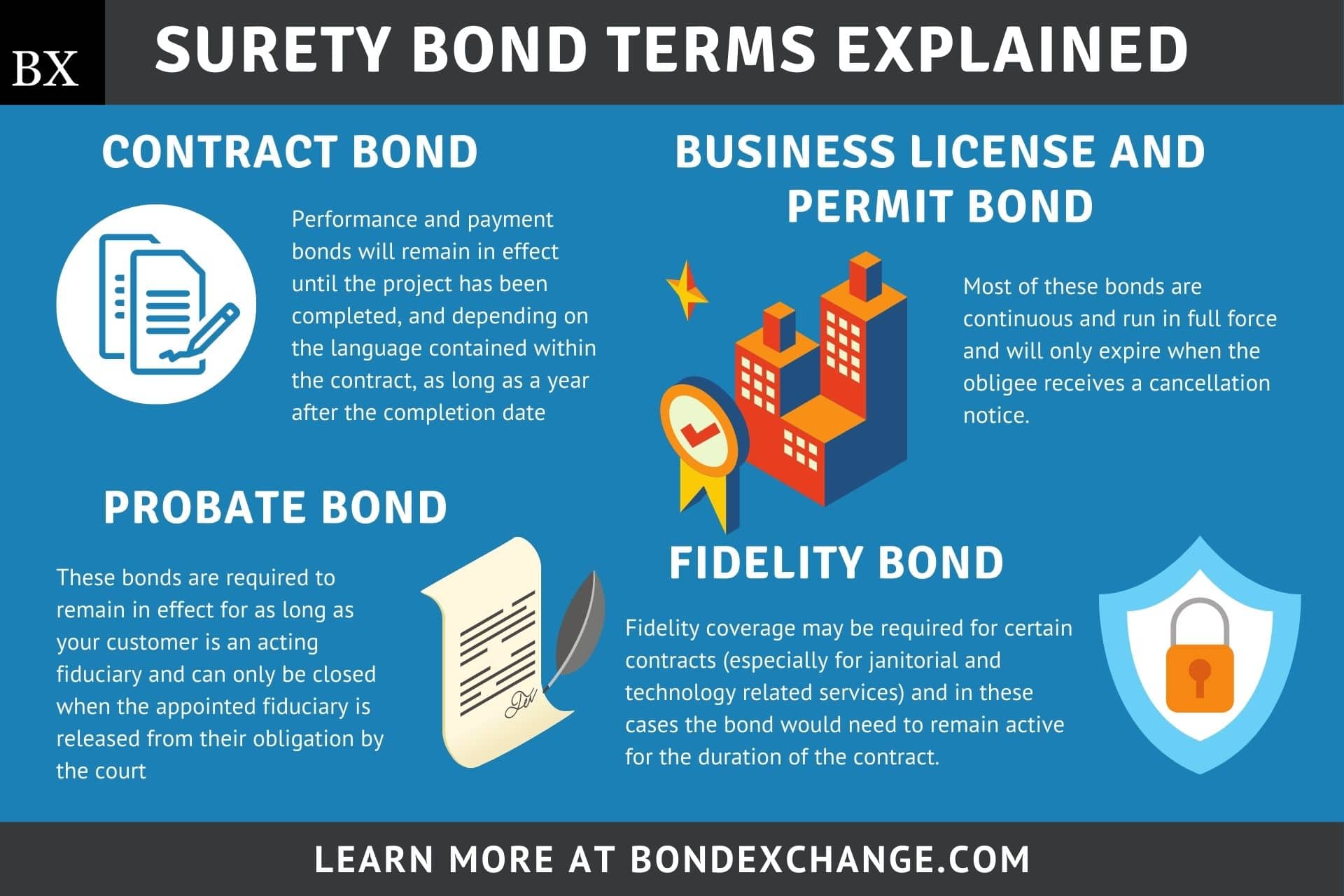Surety Bond Basics: Understanding Bond Terms
April 1, 2021

Surety bonds are different from more traditional lines of insurance, and agents who primarily deal in home, life, and auto insurance are often left scratching their heads when it comes time to renew their customers’ bonds. Unlike insurance, the term duration requirements for a surety bond is most often set by a state government agency. Additionally, many bonds contain “cancellation provisions” which mandate they stay in effect for a period of time after your customer requests to cancel their bond. In this week’s blog post, we break down surety bond terms requirements for the most common types of surety bonds, how cancellation provisions can impact the bond term, and provide insurance agents with the knowledge needed to effectively assist their surety customers.
How Long Do Surety Bonds Remain In Effect?
The bond’s term is the period during which the surety company is liable for the bond principal’s activity that causes a claim. Claims can be filed after the bond term, but only if the activity causing the claim occurred during the active term of the bond.
Business License and Permits Bonds:
Oftentimes, your customer will need to purchase a surety bond as a prerequisite to obtaining a business license or permit. Most of these bonds are continuous and run in full force and will only expire when the obligee receives a cancellation notice. Business license and permit bonds are required by a government agency, so there will always be a statute detailing the term length of the bond. Common types of business license and permit bonds include:
Contract Bonds
When you hear the term “Contract Bonds”, what are most likely being referenced are Bid, Performance, and Payment Bonds. Bid bonds ensure that your customer will honor the terms of their bid if they are awarded a contract, and do not need to be renewed. These bonds will remain in effect from the moment your customer submits their bid to the moment the contract owner awards your customer the contract. Once your customer has been awarded the contract, they may be required to purchase performance and payment bonds to ensure they do a good job. Performance and payment bonds will remain in effect until the project has been completed, and depending on the language contained within the contract, as long as a year after the completion date.
Fidelity Bonds
Fidelity bonds protect businesses and consumers from theft and are not required by any government agency. Since these bonds are not government-required, there are no statutes outlining the term length. Fidelity coverage may be required for certain contracts (especially for janitorial and technology-related services) and in these cases, the bond would need to remain active for the duration of the contract.
Probate Bonds
If your customer is appointed by a court as a fiduciary responsible for managing an estate, the court may require them to provide a probate bond. Probate bonds ensure that your customer will uphold their fiduciary duties and will act in the best interests of the estate’s beneficiaries. These bonds are required to remain in effect for as long as your customer is an acting fiduciary and can only be closed when the appointed fiduciary is released from their obligation by the court. Depending on the nature of the estate, this period can range anywhere between a couple of months to multiple years.
What are Cancellation Provisions?
Should a surety bond need to be canceled, the surety company is required to provide notice to the obligee. The obligee has set requirements for the timeline when the notice needs to be received prior to the cancellation being finalized. This period, known as a cancellation provision, is language contained within the bond form that dictates the amount of time the bond is active after a request has been made to cancel it. Typically, cancellation provisions build in a 30 day notice requirement; however, we have seen cancellation provisions requiring up to 120 days notice. Additionally, bonds that require a release from the obligee cannot be cancelled until the obligee has released the bonded principal from their obligation.
When Do Surety Bonds Need to Be Renewed?
Surety bonds generally need to be renewed on an annual basis; however, many surety companies offer premium discounts if your customer purchases their bond for a multi-year term. Some bonds are required to expire on certain dates or serve certain term duration requirements. These requirements are generally listed on the bond form, and BondExchange has compiled a comprehensive database of expiration date and surety bond terms requirements. Contact BondExchange for help determining the term length for your customers’ specific bonds.
How Can an Insurance Agent Obtain a Surety Bond?
BondExchange makes obtaining a surety bond easy. Our thoroughly developed online system was built for insurance agents like you. Simply login to your account and use our keyword search to find your bond in our database. Don’t have a login? Enroll now and let us help you satisfy your customers’ needs. Our friendly underwriting staff is available by phone (800) 438-1162, email or chat from 7:30 AM to 7:00 PM EST to assist you.
